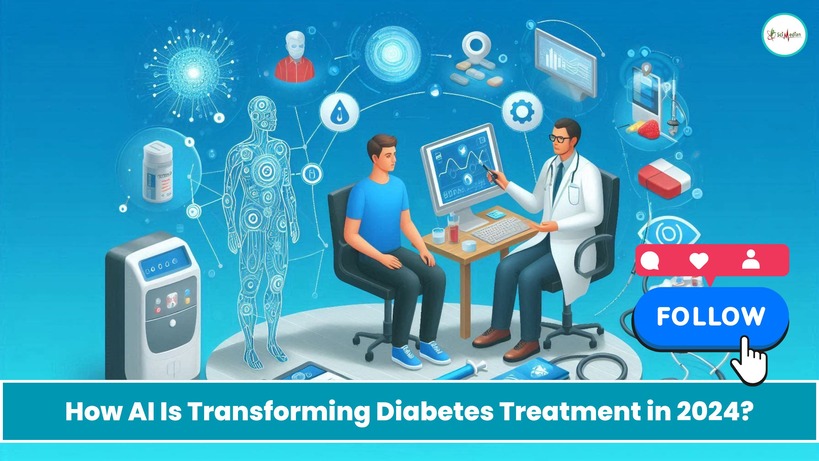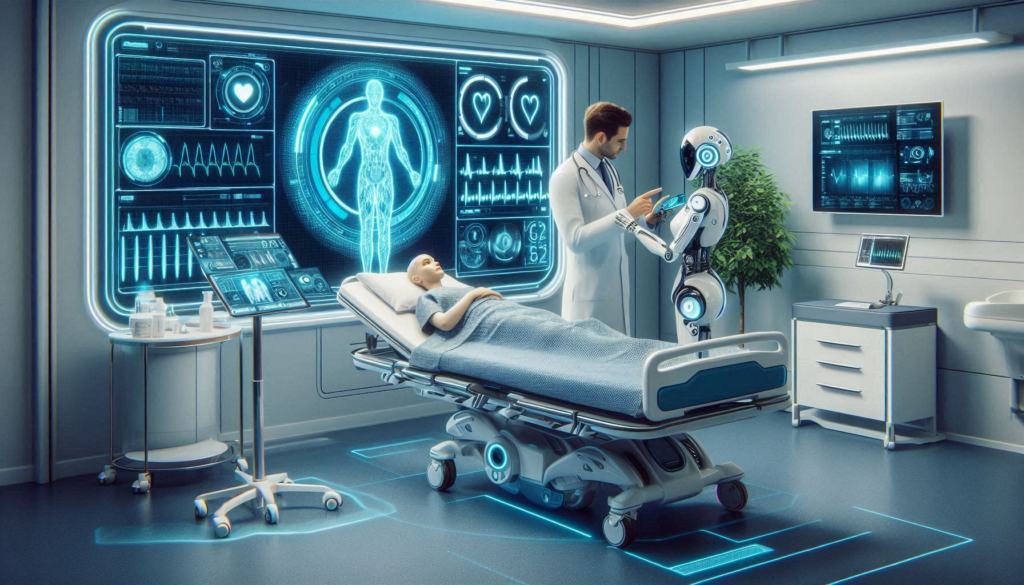Hello, Welcome to our new blog post. We are SciMedians, today in this blog we will write about “How AI is Transforming Diabetes Treatment”.
Diabetes is a chronic condition that affects millions of people globally, requiring constant management of blood glucose levels, medication, diet, and lifestyle adjustments. The advent of artificial intelligence (AI) is transforming diabetes care, offering innovative solutions that promise to improve patient outcomes and ease the burden on healthcare systems. This comprehensive exploration delves into the various ways ”how AI is revolutionizing diabetes treatment”, supported by real-world examples and studies.

The Role of AI in Diabetes Management
AI technologies are being integrated into multiple facets of diabetes care, from early diagnosis to personalized treatment and continuous monitoring. Here are some key areas where AI is making a significant impact:
- Early Diagnosis and Prediction
AI algorithms can analyze vast amounts of data from electronic health records (EHRs), wearable devices, and genetic information to identify patterns and risk factors associated with diabetes. This enables early diagnosis and prediction of the disease, allowing for timely intervention and prevention strategies.
Example: A study published in Nature Medicine demonstrated that an AI model developed by Google Health could predict the onset of diabetes up to five years in advance by analyzing retinal images. This early prediction allows for proactive management and lifestyle changes to prevent or delay the onset of diabetes.
- Personalized Treatment Plans
AI-driven systems can create personalized treatment plans based on an individual’s unique health data. By considering factors such as age, weight, lifestyle, and genetic predisposition, AI can recommend the most effective treatment options, including medication, diet, and exercise regimens.
Example: IBM Watson Health has developed AI tools that analyze patient data to provide personalized treatment recommendations. In a pilot study, Watson for Diabetes was able to suggest tailored treatment plans that improved glycemic control in patients with type 2 diabetes.
- Continuous Glucose Monitoring (CGM)
Continuous glucose monitors are wearable devices that track blood glucose levels in real time. AI algorithms can analyze the data from CGMs to provide insights into glucose trends and predict potential spikes or drops. This helps patients and healthcare providers make informed decisions about insulin dosing and dietary adjustments.
Example: Dexcom’s G6 CGM system uses AI to provide real-time glucose readings and trend analysis. A study published in Diabetes Technology & Therapeutics found that the use of CGM systems like Dexcom’s significantly improved glycemic control and reduced hypoglycemic events in patients with type 1 diabetes.
- Automated Insulin Delivery
AI-powered insulin pumps, also known as closed-loop systems or artificial pancreas, automatically adjust insulin delivery based on real-time glucose readings. These systems use machine learning algorithms to predict glucose levels and deliver the appropriate amount of insulin, reducing the risk of hypoglycemia and hyperglycemia.
Example: The Medtronic MiniMed™ 780G system is an advanced hybrid closed-loop system that uses AI to automate insulin delivery every five minutes. Clinical trials have shown that this system significantly improves glycemic control and reduces the burden of diabetes management.
- Behavioral Insights and Support
AI can analyze data from wearable devices, smartphones, and other sensors to provide personalized feedback and support for diabetes management. For example, AI can track physical activity, sleep patterns, and dietary habits, offering recommendations to improve overall health and glycemic control.
Example: The app Blue Loop, developed by the Diabetes Research Institute Foundation, uses AI to provide personalized insights and reminders for diabetes management. A study published in JMIR Diabetes found that users of the app reported improved adherence to treatment plans and better glycemic control.
- Telemedicine and Remote Monitoring
AI enables remote monitoring and telemedicine services, allowing patients to receive care from the comfort of their homes. Healthcare providers can use AI tools to monitor patient’s health data in real-time, provide virtual consultations, and adjust treatment plans as needed.
Example: The Livongo platform uses AI to provide personalized coaching and real-time feedback to diabetes patients. A study published in Diabetes Care found that users of the Livongo platform experienced significant improvements in glycemic control and reduced healthcare costs.
Case Studies and Success Stories
Several AI-driven solutions have already shown promising results in diabetes care:
- Medtronic’s MiniMed™ 780G: This advanced hybrid closed-loop system uses AI to automate insulin delivery every five minutes, providing better glycemic control and reducing the burden of diabetes management. Clinical trials have demonstrated that users of the MiniMed™ 780G system spend more time in the target glucose range and experience fewer hypoglycemic events.
- Twin Precision Treatment (TPT): A study revealed that TPT, which uses AI and the Internet of Things (IoT) to provide personalized guidance, achieved a significant rate of remission for type 2 diabetes patients. The study, published in Diabetes Therapy, showed that 84% of participants achieved remission after 12 months of using the TPT system.
- Virta Health: Virta Health uses AI to provide personalized nutritional guidance and remote monitoring for diabetes patients. A study published in Frontiers in Endocrinology found that 60% of participants achieved diabetes remission after one year of using the Virta Health platform.
The Future of AI in Diabetes Treatment
The integration of AI in diabetes care is still in its early stages, but the potential is immense. Future advancements may include more sophisticated predictive models, enhanced personalized treatment plans, and improved patient engagement tools. As AI continues to evolve, it holds the promise of transforming diabetes management, improving patient outcomes, and reducing the overall burden of the disease.
In conclusion, AI is revolutionizing diabetes treatment by offering innovative solutions for early diagnosis, personalized care, continuous monitoring, and automated insulin delivery. These advancements are paving the way for a future where diabetes management is more efficient, effective, and patient-centered.
References
- Nature Medicine, “AI Predicts Diabetes from Retinal Images”
- IBM Watson Health, “Watson for Diabetes”
- Diabetes Technology & Therapeutics, “Impact of CGM Systems”
- Medtronic, “MiniMed™ 780G Clinical Trials”
- JMIR Diabetes, “BlueLoop App Study”
- Diabetes Care, “Livongo Platform Study”
- Diabetes Therapy, “Twin Precision Treatment Study”
- Frontiers in Endocrinology, “Virta Health Study”
Thank You









